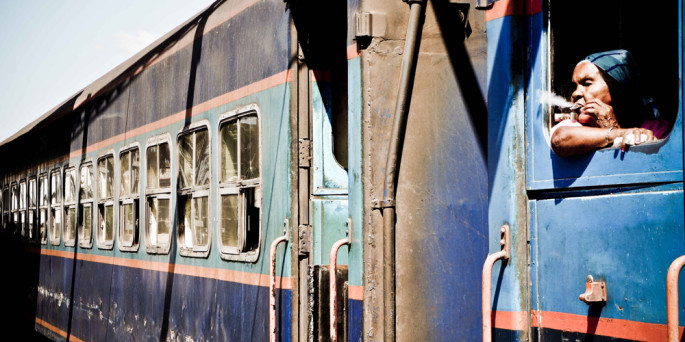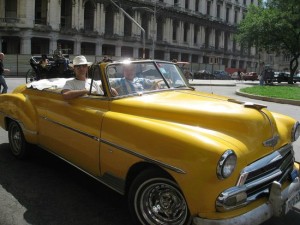
Class consciousness
SANTIAGO DE CUBA — In his youth, my dad worked in coffee shops dispensing coffee, but he never could buy a radio or a refrigerator for himself. His only possessions were his shoes, black and brown, and matching socks.
His face lit up at the prospect of a tip from a customer, but he hated that part of him that turned servile at the prospect of a tip. As a youth, he wept outside a shoe store, looking at a pair of brown shoes he wanted to buy.
In 1953, he heard about the raid on the Moncada Barracks and said (or thought) something like “What fools they are!” In May 1961, he left Santiago for two reasons. First, a man thought he had made his daughter pregnant and was looking for him gun in hand.
Second, the labor unions seized by the communists had begun to criticize and forbid pilfering, which was his only source of hope, his only door to paradise.
When he was a child, my grandmother made his school uniforms out of flour sacks. The sacks were dyed dark but, as the uniforms were washed, the logo of the flour mill — a large cogwheel — was revealed. Sometimes, schoolmates from wealthy families laughed at him and called him “Cogwheel.”
Cogwheel. That embarrassed my dad. Watching my grandmother sew the uniforms, helping her conceal the mill logo, my father learned to sew.

My mother’s life history is marked by the illnesses she had before and after the 1959 uprising. In 1955, she caught hepatitis and there was no way to afford the medicines. The prestige of her grandmother, a terribly moral woman, saved her life. A local physician gathered some medicine samples that he received periodically from pharmaceutical companies and donated them for Mother’s treatment.
Jiguaní was a town with streets of white soil, trod by poor people with threadbare clothes.
In 1961, my mother went to the Sierra Maestra to teach peasants how to read and write. At the end of her campaign, she went to Havana for the first time in her life. There, she got a scholarship to study in Santiago de Cuba and never returned to Jiguaní.
In the mid-1970s, she experienced a strange lesion in her vocal cords that left her speechless. A doctor told her not to worry and prescribed radiation treatment for cancer.
The expression “affording an illness” had disappeared. Cuba was another country, a controversial country that had taken responsibility for the poor, both good and bad. In 1985, Mother came down with breast cancer. The family thought she’d die. She was given two long treatments of chemotherapy. I remember trips to Havana and a lot of hair in the bathroom wastebasket. She survived and recovered, enough to take my brother and I to school, to see us grow, change and degenerate.
In 1962, my father obtained his first property: a freezer. My grandmother had gone to Havana to work in the new Ministry of Education and she was assigned a huge house in the Siboney district. The owners had left, the neighborhood was almost empty and the house had been looted. All my people in Santiago de Cuba benefited from the items in that house.
My dad got the freezer and a lamp, but he didn’t have a home, never mind a kitchen. A friend of his had developed color blindness and had a motorcycle he could no longer ride. Dad proposed a swap and that’s how he got the motorcycle with which he’s still associated.
Neither my father or my mother has broken ties in 56 years with that social class that was lifted from exclusion. They will grudgingly admit that social differences have emerged in Cuba, but the way (conscious or not) in which they react to a statement mocking socialism or to an opinion that praises capitalism comes from a position of class. They can identify a ruby inside a bag of glass marbles.
In 1992, my family vacationed in Los Helechos [The Ferns], a hotel in Topes de Collantes. The most interesting feature of this hotel were its guests: ministers, high-ranking officials or outstanding workers, like my mother. They were different from the other people in Santiago, that is, they were handsome, well dressed, luminous. Among them, I felt special.
One day, walking away from the hotel, I heard some boys laughing behind me. I turned around and realized the object of their amusement. Me. That was the first time I felt that kind of shame, and it was a strange way to feel my father’s experience: they were laughing at my clothing, a pair of shorts and a shirt made of linen of the type used for flour sacks. My mother had ordered them from a seamstress in preparation for our trip to the mountain hotel. I stopped, my heart in a vise, and let the boys walk past and away.
Born in me was a totally unknown feeling. The pink color of the boys’ skin, their straight hair came into my world from a kind of parallel paradise, related but different. One could stretch out a hand and touch their luminous bodies, but in reality one didn’t touch them.
They kept repeating “saquito” — sackcloth. Sackcloth. They were Cubans who lived (and maybe lived during the ensuing crisis) in a country different from mine.
This kind of mockery I didn’t know was nurtured from the heraldry of privilege. The boys belonged to a class figure, let’s say, an empowered class. And an empowered group does not include just leaders; there are families, for example, that live from remittances, or from their work, or from the arts, and they have an ideology — even an esthetic taste — associated to that source of income.
The most important part of that experience was the feeling I experienced — a sense of difference and vindication.
In 1992, the Special Period had not quite begun but, through the little tics, symptoms and pettiness that emerged naturally, we could see a glimpse of the future more or less established or in danger of being definitely established.
It is symptomatic to hear people who are interested in creating clinics, paying the dentist or specific medical examinations as a solution to the shortage and stealing of resources. Some are empowered with total or partial knowledge of the cause; others simply repeat what they hear, what’s in the air.
Following this “common sense,” some people will volunteer to pay for a tooth filling but won’t be able to afford cancer surgery. These forces of change, extremely contagious and accredited, are those that habitually construct “common sense” or promote liberal changes in all societies.
The humblest of us, who are in the majority, would be committing suicide if we believed that those bells — filled with good taste and cynicism in the style of Emil Cioran — toll for us. They do not toll for us. That is why we must find a voice, a voice much better than ours, stripped of greed and heraldry, that will come to the fore and make itself heard.
In 1990, my dad decided to exchange his motorcycle for an old, second-hand car. Months later, socialism went belly up in the land of poor people and dead souls described by Chekhov and Gogol. We sold the car; with it disappeared the only pedigree that I, filled with pride, often displayed: a 1952 Chevrolet.
My parents could spend whole days talking about subjects like this (they can identify a ruby in a bag of glass trinkets) but they would be mistaken for loonies or fanatics.
Progreso Weekly authorizes the total or partial reproduction of the articles by our journalists, so long as source and author are identified.


